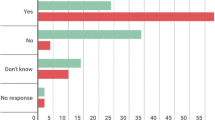Abstract
Objective
This study assessed the impact of a Leadership Fellowship, sponsored by the American Psychiatric Association (APA) and APA Foundation, on the careers of psychiatry residents and examined the influence of gender and year of Fellowship completion. This 2-year program for residents offered multiple opportunities to interact with professional leaders at various levels.
Methods
A retrospective online survey of alumni of the APA Leadership Fellowship, who had completed this Fellowship between 2003 and 2019, was conducted.
Results
Out of the 93 psychiatrists who were sent the survey, 59 alumni responded (60.8% response rate). Most respondents had remained involved with organized psychiatry groups and 80% held leadership positions. Respondents reported high levels of satisfaction with the APA Fellowship experience, noting the importance of peer networking. Overall, male and female respondents were similar in their subsequent leadership positions and satisfaction with the survey. Similarly, Fellows who completed the Fellowship in 2003–2015 had responses about the experience that were largely similar to those in the 2016–2019 cohort that had not yet completed their residency.
Conclusion
A vast majority of alumni of the APA Leadership Fellowship had become leaders in their workplace or organized psychiatry groups. The leadership-focused career development programs for psychiatry trainees are important avenues to develop a diverse cohort of future leaders in psychiatry.
Similar content being viewed by others
References
King AS. Evolution of leadership theory. J Decision Makers. 1990;15(2):43–56.
Accreditation Council for Graduate Medical Education. Bridging the leadership gap for newly appointed chief residents. 2019; Available from: https://www.acgme.org/Newsroom/Blog/Details/ArticleID/9764/Bridging-the-Leadership-Gap-for-Newly-Appointed-Chief-Residents.
Health HTHCSoP. From physician to physician leader: developing your skills for success. 2018. p. https://www.hsph.harvard.edu/ecpe/physician-leader-skills-success/.
Sfantou D, Laliotis A, Patelarou A, Sifaki-Pistolla D, Matalliotakis M, Patelarou E. Importance of leadership style towards quality of care measures in healthcare settings: a systematic review. Healthcare. 2017;5(4):73.
Fast Company Staff. The power of peer-to-peer networks. Fast Company. 2005.
Roberts LW, Warner TD, Horwitz R, McCarty T, Roberts B. Honorary fellowship awards and professional development in psychiatry. Acad Psychiatry. 1999;23(4):210–21.
Roberts LW, Kim JP, Samuels C, Winstead D. Perceptions of the professional development value of honorary fellowship award experiences. Acad Psychiatry. 2016;40(5):761–7.
Jeste DV, Halpain MC, Trinidad GI, Reichstadt JL, Lebowitz BD. UCSD's short-term research training programs for trainees at different levels of career development. Acad Psychiatry. 2007;31(2):160–7.
Choosing a Medical Residency: Regions of the United States. FMG Portal2019; Available from: https://fmgportal.com/choosing-a-medical-residency-regions-of-the-united-states/.
Black ML, Curran MC, Golshan S, Daly R, Depp C, Kelly C, et al. Summer research training for medical students: impact on research self-efficacy. Clin Transl Sci. 2013;6(6):487–9.
Dumbauld J, Black M, Depp CA, Daly R, Curran MA, Winegarden B, et al. Association of learning styles with research self-efficacy: study of short-term research training program for medical students. Clin Transl Sci. 2014;7(6):489–92.
Jeste DV, Twamley EW, Cardenas V, Lebowitz B, Reynolds CF. A call for training the trainers: focus on mentoring to enhance diversity in mental health research. Am J Public Health. 2009;99(S1):S31–S7.
Author information
Authors and Affiliations
Corresponding author
Ethics declarations
Disclosures
Dr. Jeste is a member of the Board of Directors of the American Psychiatric Association Foundation. Ms. Patel and Dr. Levin are, and Dr. Parekh was, full-time employee/s of the American Psychiatric Association. None of us has financial relationship with any pharmaceutical company.
Additional information
Publisher’s Note
Springer Nature remains neutral with regard to jurisdictional claims in published maps and institutional affiliations.
Rights and permissions
About this article
Cite this article
Jeste, D.V., Patel, S., Lee, E.E. et al. American Psychiatric Association’s Leadership Fellowship Program: Short-term and Longer-term Outcomes. Acad Psychiatry 45, 142–149 (2021). https://doi.org/10.1007/s40596-020-01339-1
Received:
Accepted:
Published:
Issue Date:
DOI: https://doi.org/10.1007/s40596-020-01339-1




